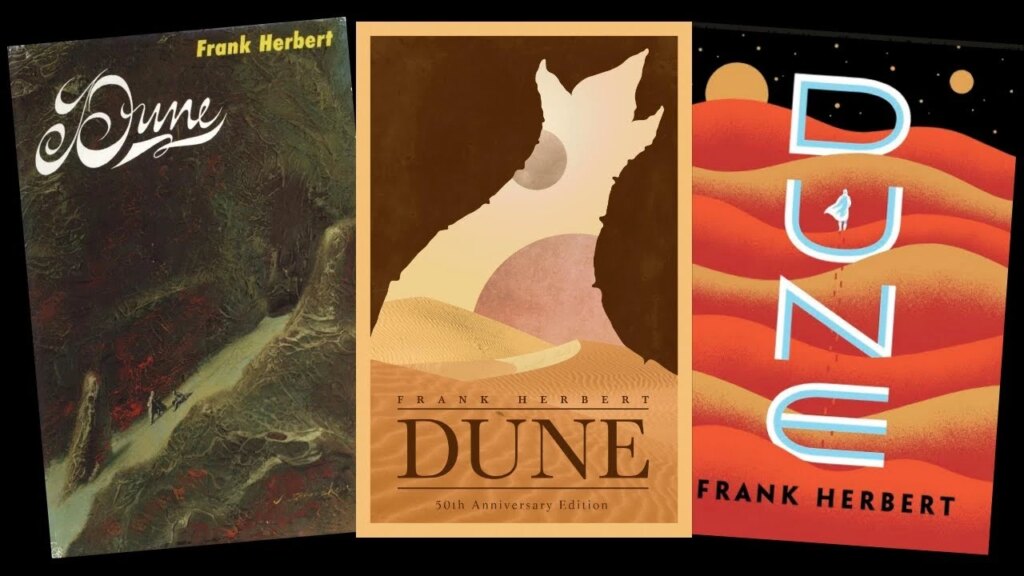“The mystery of life isn’t a problem to solve, but a reality to experience.” As bookworms, bibliophiles, or ravenous readers — whichever term you choose for yourself — don’t we experience so many mind-blowing realities? The Dune books by Frank Herbert have often been described as life changing or at least modifying readers’ outlook on …
A (Mostly) True Homage to Frank Herbert’s Books
The recent Denis Villeneuve Dune films follow Timothée Chalamet as Paul Atreides, whose family is forced to engage in a death-defying war for the desert planet Arrakis. Paul’s visions for a dark and deadly future lead him onto a journey to face his fears and save his family. Both Herbert’s political and social messages as well as his incredible knack for weaving near absurd yet entirely believable storyscapes are well-represented in the films.

The films do a great job at capturing the noble Atreides family, the setting on the planet Arrakis, the Bene Gesserit ‘all female school’, and more, but do have shortcomings. Arrakeen, the bustling capital of Arrakis is sadly not really shown at all, and the Fremen have taken on a more ‘appeal to all’ approach rather than sticking to the books’ descriptions. Speak: they’ve been diversified rather than sticking to the Islamic roots Herbert so keenly described, something which could have been achieved by respectfully consulting with cultural representatives instead.
Besides these obvious disconnects, however, the key themes Herbert was so well-known for are all there. Dune is known for making a socio-political connection between power and human suffering. His books highlight the dangers of politics blended with religion in particular, and the films are no different. The seamless peppering of the movie adaptations using popular quotes from the books is particularly welcome. “I must not fear. Fear is the mind-killer.” If reading or hearing these doesn’t give you goosebumps, why do you read?
Epically Weaved Worlds and a Classic Hero’s Story Arc
Some consider the Dune series The Lord of the Rings of Science Fiction. Writers and readers alike are notably in awe of both Herbert’s and Tolkien’s unbelievable talent for building worlds. The Dune books capture richly detailed, immersive universes with elaborate social, political, and ecological systems.
Herbert, like Tolkien, often drew on diverse cultures and histories. He spun a philosophical depth into his stories, exploring themes of politics, religion, ecology, and human consciousness. What makes his books continue to offer appeal nearly 40 years after his death are the way they provoke and challenge us to look inward and think.

Paul Atreides’ story follows a classic hero’s journey archetype that’s universally appealed since Homer’s Odyssey. Paul and many of his fellow characters grapple with questions of their identity and destiny. They face weighty challenges that are, at least on a philosophical level, entirely relatable.
As a main character, Paul Atreides is a classic Byronic hero, so appealing because of his complexity and humanity. Paul is neither brooding nor melancholic, as so many Byronic heroes are, but still has a dark quality that is so addictive to readers. He offers a bursting rebellious energy and nonconformity, challenging the established order and striving for more. He’s intelligent, highly perceptive, and both physically and mentally adept. His struggles with his own destiny and the weight of his prophesied role as the Kwisatz Haderach make him decidedly human, despite his quite superhuman role as the same.
Beautifully Crafted Dialogues and a (Mostly) Accurate Adaptation
Where the books have created the planet Arrakis and beyond in our heads since their inception, the films by Denis Villeneuve have taken this a step further. The world-building and visual spectacle presented in both Dune: Part One and Dune 2 bring the planet and its expansive desert vistas to life in a stunning fashion.
The casting, in particular with regards to Timothée Chalamet’s portrayal of Paul Atreides is spot-on and favoured by fans of the original novels. Herbert’s writing is weaved beautifully into the screenplay, and the epic scale and grandeur of his work isn’t diminished in any way by Villeneuve’s cinematography. If anything, his beautifully crafted dialogues are brought to life in a way that’ll be satisfying to book lovers. This is a relief to all of us who have ever been disappointed by a film adaptation of a beloved book or series.
.jpg)
Some parts of the original stories have been changed or omitted, for example the weird and wonderful storyline of the child Alia and her ancestral wisdom, the timescales of Paul’s story, and the city of Arrakeen. Interestingly, most of this still works quite well though fans will almost certainly miss Alia’s quirky character and find the ‘pre-born’ voice from within her mother’s womb (almost) a little too odd. Beyond this, we had limited complaints, as Villeneuve’s interpretation seems to enhance the originals, rather than taking anything from them.
Emotionally, the epic scale and high stakes involved in Paul’s storyline leave viewers and readers of the books alike breathless. Themes of both sacrifice and redemption, identity and belonging all resonate with viewers. These are of course amplified by the epic music provided by composer Hans Zimmer, making for a multi-sensorial experience that’ll have you re-visiting both books and films again and again.
Epic Cinematography and a Respectful Interpretation of the Books
Watching a movie adaptation of a beloved book or series can sometimes be challenging. How many of us have really looked forward to a film only to find it didn’t truly respect the original tone, story, and characters the author created? Both of the modern Dune movies will delight fans of the original books by Frank Herbert. True, they don’t follow every single nuance of the original literary works, but they adapt and expand on Herbert’s work in a respectful and meaningful way.

The epic cinematography only enhances and makes visible the richly detailed universe of Dune that we’ve created in our own minds as readers. Clever casting, fantastic music, and rich details make the movies enhanced interpretations of the original — rather than directors and actors running haywire with an idea of their own.
The paradox here is that, of course, the movies are different from the books, and some little changes such as the more bland representation of the Fremen will jar with some. Overall, however, the spirit of Herbert’s books is well represented, the themes are there, and Villeneuve’s conductorship orchestrates something magical that bibliophiles will love.
Join our community of 1.5M readers
Like this story? You'll love our free weekly magazine.








